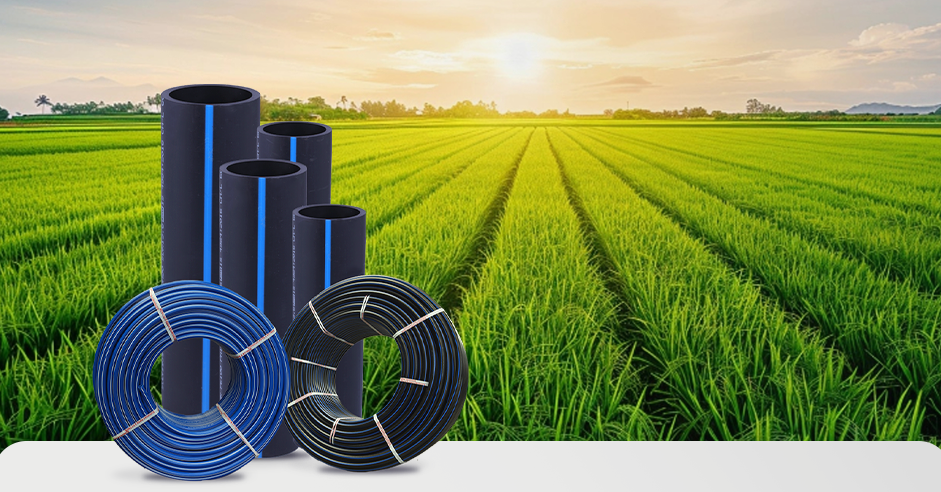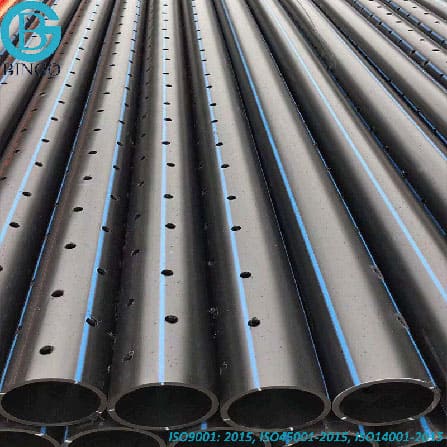Reasons Why hdpe pipe in stock Midland TX Is Valuable for Local Industries
A Comprehensive Overview to the Numerous Uses HDPE Pipeline in Construction and Market
HDPE pipes have actually become a crucial element in modern-day building and commercial applications. Their unique properties, such as resistance to deterioration and lightweight layout, make them appropriate for a wide variety of uses. From water systems to farming irrigation, HDPE pipes offer remedies that boost efficiency and sustainability. Understanding their diverse applications is crucial for experts aiming to optimize framework. What details benefits do these pipes offer each market?
Water Supply and Circulation Solutions
Supply of water and distribution systems are critical components of city facilities, frequently relying upon high-density polyethylene (HDPE) pipes for their sturdiness and performance. These systems transportation drinkable water from treatment centers to consumers, making certain ease of access and safety. HDPE pipelines are preferred for their resistance to deterioration, chemicals, and severe temperature levels, which enhances their long life and decreases upkeep prices. Additionally, their light-weight nature permits much easier setup and transportation, making them optimal for various city and country applications.
The flexibility of HDPE pipes enables them to be mounted in tight areas and around obstacles, lessening the requirement for substantial excavation (custom hdpe pipe manufacturing Midland TX). In addition, their smooth indoor surface area reduces rubbing losses, boosting water circulation prices. As cities remain to grow, the need for reputable supply of water systems raises, positioning HDPE pipes as a lasting service for modern-day framework projects. Their tested track document makes them a recommended option amongst engineers and city planners alike
Wastewater Monitoring and Treatment
Effective wastewater management and therapy are necessary for maintaining public health and wellness and environmental top quality. HDPE pipelines play a crucial function in this process as a result of their longevity, resistance to rust, and capacity to endure harsh chemicals. These pipes are frequently used in different applications, including sewage systems, stormwater water drainage, and wastewater therapy facilities. Their lightweight nature assists in less complicated setup and transport, lowering labor expenses and time.
In enhancement, HDPE pipelines have a smooth indoor surface that minimizes rubbing loss, promoting reliable flow prices. They are also much less prone to leaks and failures compared to conventional products, making certain that pollutants are contained effectively. Their flexibility enables for versatility in numerous dirt problems, making them appropriate for varied ecological setups. As sectors progressively prioritize sustainable practices, using HDPE pipes in wastewater administration systems lines up with objectives for minimizing ecological impact and boosting resource healing.
Agricultural Irrigation Solutions
In farming settings, efficient watering solutions are essential for maximizing plant yields and managing water resources. HDPE (High-Density Polyethylene) pipes play a crucial role in modern-day irrigation systems as a result of their resilience, flexibility, and resistance to rust. Their capability to endure high pressures makes them excellent for both surface and subsurface watering applications, ensuring uniform water circulation across areas.
Farmers can utilize HDPE pipelines in drip irrigation systems, which supply water straight to plant roots, reducing wastefulness and promoting healthy development. Furthermore, these pipelines are light-weight and simple to mount, reducing labor prices and installation time. Their lengthy life-span and low maintenance requirements further enhance their appeal in farming techniques.
Additionally, HDPE pipelines are eco-friendly, as they can be reused and do not seep harmful chemicals right into the dirt. This makes them a lasting choice for this link farmers intending to take on eco-friendly farming approaches while making the most of productivity.
Industrial Applications and Procedures
Flexibility is a hallmark of HDPE pipes, making them vital in different commercial applications and processes. These pipes are widely utilized in chemical handling sectors because of their exceptional resistance to a wide variety of destructive materials. HDPE's lightweight nature, combined with high tensile toughness, enables simple installment and lasting efficiency in requiring atmospheres.
In the oil and gas sector, HDPE pipelines play a necessary role in transporting hydrocarbons and gases, many thanks to their toughness and flexibility - American Plastics HDPE Pipe Manufacturing. Additionally, they are used in mining procedures for the transportation of slurry and various other materials, where typical piping systems might fail
Furthermore, HDPE pipes are increasingly utilized in manufacturing centers for water system lines and wastewater administration. Their capability to hold up against severe temperature levels and pressures makes them suitable for a variety of commercial procedures. Generally, HDPE pipes add greatly to efficiency and safety throughout diverse industrial applications.
Stormwater Monitoring and Drainage Equipments
Stormwater management and sewer line cleaning service drainage systems are vital components in metropolitan infrastructure, created to handle excess rainfall and reduce flooding dangers. High-density polyethylene (HDPE) pipes are significantly made use of in these systems due to their durability, versatility, and resistance to corrosion. These pipelines successfully carry stormwater far from inhabited locations, reducing surface area overflow and preventing waterlogging.
HDPE's light-weight nature facilitates simpler installment, decreasing labor prices and building and construction time. In addition, its resistance to chemicals and environmental stressors warranties long life and integrity in numerous environments. In enhancement to conventional drainage applications, HDPE pipelines are likewise employed in ingenious services such as eco-friendly infrastructure, that includes rain gardens and permeable pavements.

Regularly Asked Concerns
Just How Does HDPE Pipe Contrast to PVC Pipeline in Cost?
As a whole, HDPE pipe has a tendency to be extra expensive than PVC pipeline due to its enhanced resilience and flexibility. Nevertheless, long-term expense factors to consider, such as upkeep and life expectancy, may prefer HDPE in specific applications.

What Is the Life Expectancy of HDPE Water Lines Under Diverse Problems?
HDPE pipelines generally have a life expectancy of 50 to 100 years, depending upon ecological problems, installment practices, and use. Factors such as temperature level, dirt kind, and exposure to chemicals can substantially influence their sturdiness.
Can HDPE Pipes Be Recycled After Usage?
Yes, HDPE pipelines can be reused after use. The recycling process involves melting down the product, allowing it to be repurposed into new products, thus promoting sustainability and reducing environmental influence related to plastic waste.
Exist Any Type Of Specific Setup Challenges With HDPE Pipelines?
Installment difficulties with HDPE pipelines consist of appropriate jointing techniques, ensuring appropriate trench conditions, about his and taking care of thermal development. In addition, skilled labor is required to take care of customized tools, which can complicate the installation process in numerous atmospheres.

What Qualifications Should I Look for When Getting HDPE Pipings?
When acquiring HDPE pipelines, one must seek certifications such as ASTM, AASHTO, and ISO, which verify quality and compliance with sector criteria, guaranteeing resilience and performance in different applications. - Texas hdpe pipe manufacturer